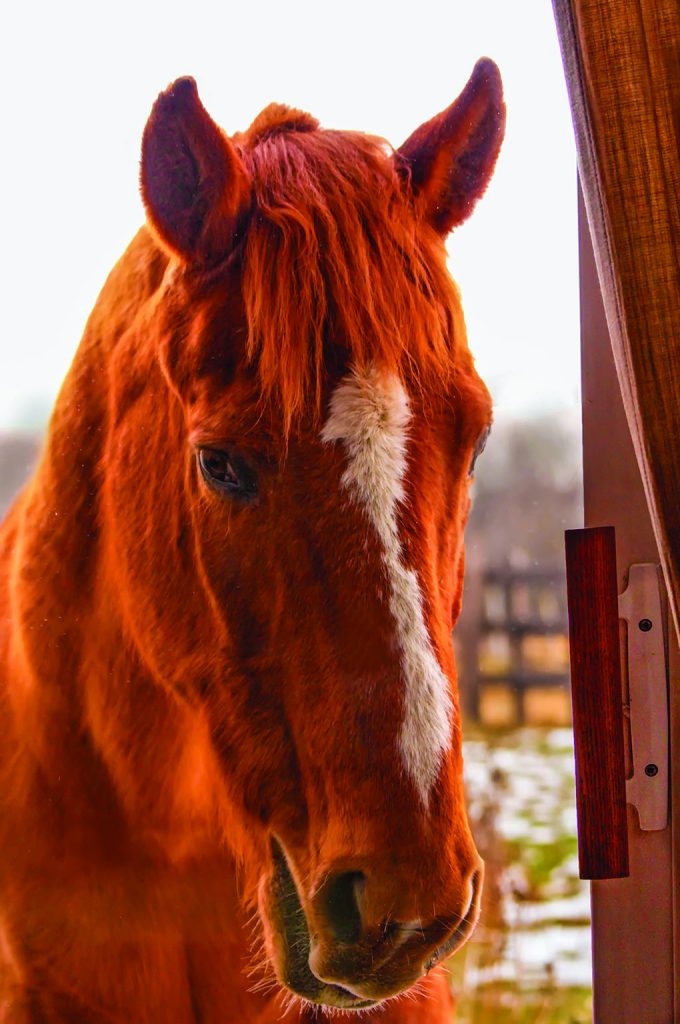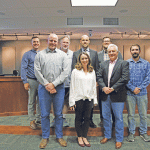VS outbreak sweeps Larimer County, but this too shall pass
By Katie Harris
The Surveyor
A banner at the top of Loveland therapeutic riding center, Hearts and Horses’ website on Monday read, “Hearts & Horses is currently closed for two weeks due to the Vesicular Stomatitis (VS) virus that has been identified in our herd. The property is closed to the general public at this time.”
The Friday prior, an email went out to all 4-H families in Larimer County announcing extra precautions being taken this year to keep VS (also referred to as VSV) away from the Larimer County Fair and Rodeo, which is just getting under way.

Within the local equine community, the collective feeling of trepidation has become tangible as the disease has spread throughout the region in the past few weeks, causing equestrians to end their show seasons early and one equine facility after another to go under quarantine.
And while any disease that affects livestock and spreads easily is sure to raise alarm, Ragan Adams, Colorado State University (CSU) veterinarian and coordinator for the Veterinary Extension Specialist Group said things could be worse.
“This is an ‘Oh, darn it-disease,’ not an ‘Oh no, this horse is going to die-disease,’” she said. “It makes you sad if your animal gets it and doesn’t feel good and can’t go to shows over the summer, so we want to try to stop the spread, but this isn’t something that will kill your horse.”
In fact, according to a fact sheet released by the United States Department of Agriculture (USDA) in May 2012, it is rare for an animal to die from VS. The greater concern is that because the disease is highly infectious and currently only known to occur in the western hemisphere, other countries may choose to block trade with the U.S. during an outbreak. For this reason VS is internationally recognized as a reportable disease, meaning veterinarians who suspect it in an animal are required to report their suspicions to the Colorado Department of Agriculture (CDA).
In addition, the fact sheet mentions that VS presents symptoms similar to those of foot-and-mouth disease, which was eradicated from the U.S. in 1929, and swine vesicular disease, which is also not found in the U.S.
“VS is a disease that is heavily regulated because we want to make sure it’s that disease and not something bigger,” said Adams. “We need to contain the VS outbreak but also distinguish from foreign animal diseases not in this country.”
While the staff and volunteers at Hearts and Horses can rest easy knowing the 31 horses that reside at the non-profit facility will eventually make it through none the worse, their quarantine will remain in place through the end of the month.
“We closed our property even before we knew it was in the area, as soon as it was in the county, to any horse movement coming or going,” said Executive Director Jan Pollema. “Our equine staff noticed signs on [July 16], we had a vet on site and he looked at all the horses and found symptoms. By default, with our vet reporting it to the state, that put us on quarantine.”
The Hearts and Horses herd has been lucky so far, according to Pollema, in that they seem to have developed a mild strain haven’t needed any supportive measures beyond occasional electrolytes to fend off dehydration. The only symptom the horses have exhibited, lesions in the mouth, haven’t kept them from eating or drinking.
“Good biosecurity precautions were put in place on Monday, including closing the property down to only essential people, and doing chlorine foot baths for anyone coming and going,” said Pollema. “The quarantine lasts two weeks from the last horse showing signs so it should be lifted on the 31st.”
As the Hearts and Horses crew bide their time, they can take heart in knowing they’re not alone. According to the CDA, as of July 18th, Larimer County had the highest number of VS quarantines in the state, totaling out at 18, with Weld County a close second at 14. Adams blames the outbreak on the unusual weather we’ve experienced this season.
“With more moisture there are more vectors around to spread disease,” she said. “If it starts in Texas, then goes to New Mexico, and we have a wet summer, it’s coming.”
True to form, the year’s first case of VS was reported in Texas on June 24th, followed by a case in New Mexico on June 26th. Colorado’s first case was reported on July 3rd.
Outbreaks that make it up to Colorado typically happen once every five to 10 years. The last time was in 2015 when, according to CSU’s Veterinary Teaching Hospital’s website, over 200 properties were quarantined, primarily in Northern Colorado. Pollema remembers quarantining one horse that exhibited symptoms during that outbreak.
Now, nearly a month after Colorado’s first reported case, Larimer County Fair and Rodeo organizers are gearing up for this year’s event by asking participants to keep symptomatic animals at home. In addition, the July 19th email advised 4-Hers to expect longer wait times at check-in as thorough vet checks are performed on each animal, and warned participants of the risk of exposure to VS, despite extra precautions being taken.
Still, VS or no VS, the show will go on.
“This is something that’s a pain in the neck for two to three weeks,” said Adams. “You have some horses who don’t want to eat or drink, but they will recover. They’re not going to die.
The important thing is to be sensible, not to panic, but to do our best to minimize the outbreak.”
For Pollema, and others waiting out quarantines, the waiting game will end soon enough and it will be back to business as usual at the therapeutic riding center.
“I don’t want to take away from the ramifications; we are closed down and it’s a bummer,” she said. “But in the larger scheme of things, it’s not the end of the world.”
- September, 29 2022

News Bites – September 29, 2022
Larimer County Manager Lorenda Volker today announced the appointment of Laurie Kadrich as the Assistant...
- February, 15 2019

Petition seeks to put limits on debt ...
By Rudy Hemmann The Surveyor Tuesday evening’s meeting of the Berthoud Board of Trustees became...
- April, 21 2022

Neighbors: Meet Bill Hug
Anyone who meets Bill Hug comes away with a few impressions about him. First, he...
- June, 24 2019

New principal for Berthoud High School
By Dan Karpiel The Surveyor According to a source close to the school, the Surveyor...
- October, 05 2018

Volunteer crossing guards needed for ...
By Shelley Widhalm The Surveyor Berthoud Elementary School parent Kelly Seaton wants to make sure...
- July, 22 2021

Suspect in Fort Collins homicide arre...
The Fort Collins Police Department announced Tuesday that a suspect in a deadly shooting outside...

Unified basketball comes to Turner Middle School
Community News

Mike Grace says goodbye as Brett Wing joins town board
Community News
POLICEBLOTTER
Community News
Northern Water sets C-BT quota at 70% for 2024
Community News

Emotions run high during Revere Property hearing
Community News
Snowpack at 119% above normal
Community News

Karspeck to serve third term as Berthoud mayor
Community News
COMMUNITY CALENDAR:
Community Calendar – add an event
Homestead Fine Art Gallery First Fridays OPEN HOUSE
03 May 4:00 PM - 7:00 PM
Homestead Fine Art Gallery First Fridays OPEN HOUSE
07 Jun 4:00 PM - 7:00 PM
Homestead Fine Art Gallery First Fridays OPEN HOUSE
05 Jul 4:00 PM - 7:00 PM
Homestead Fine Art Gallery First Fridays OPEN HOUSE
02 Aug 4:00 PM - 7:00 PM
Homestead Fine Art Gallery First Fridays OPEN HOUSE
06 Sep 4:00 PM - 7:00 PM
Homestead Fine Art Gallery First Fridays OPEN HOUSE
04 Oct 4:00 PM - 7:00 PM

